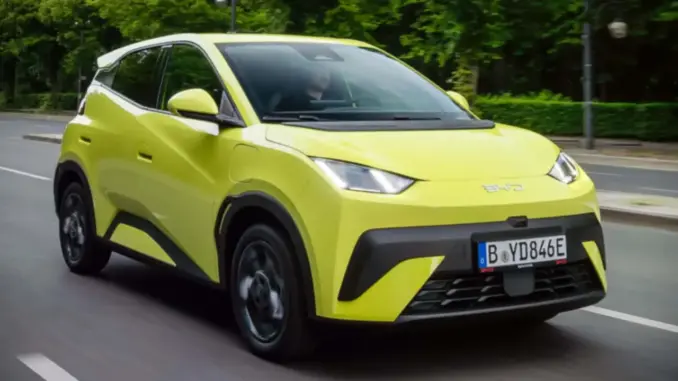
A recent survey by Escalent indicates Europeans are increasingly open to Chinese cars. At the same time, consideration for American vehicles is falling across the continent. However, the research also shows Europeans would not pay a premium for Chinese cars, even if they were superior.
This year’s IAA could almost be described as a Shanghai Auto Show satellite, with numerous Chinese marques filling the exhibition halls and unveiling ambitious plans. It can be a lot to take in. This year, yet another Chinese marque, GAC, revealed plans to introduce the reasonably priced Aion V to Europe. There are many Chinese marques in Europe, so surely they can’t all be succeeding?
The verdict is still unclear. Some are hit-or-miss, some are priced too steeply, and some might not quite match European tastes, but the gains Chinese brands are making are producing tangible impacts. Market research firm Escalent is finalizing its Chinese Automotive Impact Brands study for 2025, and there are already some intriguing findings. KC Boyce, the firm’s Vice President of Powertrain Innovation & Energy Transformation, shared some preliminary results from the study with InsideEVs, and there’s a lot to unpack.
Escalent polled buyers in the UK, Germany, France, Spain and Italy between May 21 and July 31 of this year, and found that the standing of Chinese brands is exceeding that of American brands. Specifically, the firm discovered that buyers are more inclined to consider a Chinese car than an American one. The study indicated that 47% of prospective buyers surveyed would consider a Chinese car, compared with 44% of the same buyers considering an American car.
This is a substantial gain for Chinese brands; in 2024, the same study reported that only 31% of buyers would consider Chinese cars. It’s also a notable decline for American brands, since in 2024, 51% of buyers said they would consider buying American.
Part of the reason, according to Escalent, is that trust in Chinese brands has increased. Chinese marques continue to expand in Europe, including advertising, marketing and building dealer networks. Consumer trust in Chinese brands remains low, however. In the study, only 19% of participants trusted goods from China, but this is up from 12% in 2024. It’s also close to 24% for the US, which is down from 31% in 2024.
But why? One can easily speculate that anti-US sentiment in Europe has risen markedly this year because of the back-and-forth tariffs and geopolitical tensions that have erupted since the Trump administration assumed office this year. These tensions extend beyond tariffs and include defense and diplomacy between the U.S. and Europe. It doesn’t require a full-time data archivist to go online and see that Europeans are souring on the U.S.
I asked Boyce if this explains why the scores for American cars are so weak. Boyce said that Escalent’s study wasn’t set up to ask why attitudes toward Chinese cars are shifting so quickly, but he did concur that geopolitical tensions are one possible reason.
“Although the study wasn’t intended to assess why consideration was changing over time outside of Chinese brands, I have to believe that geopolitics (tariffs, trade deals, the US stance on Russia/Ukraine) is playing into European buyers’ sentiment about the US and US auto brands,” Boyce said in an email.
He noted that trust in goods from most countries remained relatively flat, except the U.S., which was the only country to lose ground. Similarly, when it came to Europeans’ willingness to buy cars from the six countries surveyed, the U.S. is the only country that declined significantly.
That doesn’t mean Chinese brands are free from challenges, though. Europeans still expect Chinese cars to be cheaper than vehicles from established brands. A full 72% of respondents think a Chinese car should cost less than what they paid for their current car. The study also found that only 13% of buyers would be prepared to pay more for a Chinese car, even if it is objectively superior. The majority of respondents expect a discount.
This could complicate matters for Chinese marques as they expand in Europe. Of course, there’s a substantial market for small and medium hatchbacks and crossovers in Europe; MG and BYD’s success with cars like the MG 4 and BYD Dolphin has shown there is demand. But many of these brands aim to move upmarket and enter premium segments. This study suggests Europeans may not be willing to pay luxury prices for them.
That’s bad news for some exhibitors at this year’s IAA show. Aito displayed its premium EV and range-extended crossovers at IAA, but it’s unclear whether European buyers will pay luxury-SUV prices for an EV from an unfamiliar marque. The Aito M9 isn’t inexpensive even in China, with prices nearing $80,000 in fully loaded trim. Even before tariffs, the M9 would compete with cars like the Mercedes-Benz GLE-Class or EQE SUV. It may be a big ask for Europeans to spend heavily on a new brand, even without considering the baggage and negative perceptions some hold about Chinese brands.
Now, though, there appears to be baggage for American brands as well. Boyce said Escalent’s study did not probe why perceptions of U.S. brands have fallen, either. But he did say the study suggests Europeans are more positive about new, inexpensive EV offerings from China, which could indicate people view these brands as increasingly trustworthy. Conversely, the American brands that sell in Europe (aside from Tesla) don’t offer many cheap or small EV models for Europeans to choose from. My hunch is that this lack of presence in one of Europe’s most important markets isn’t helping the image of American brands.
The full 2025 study hasn’t been published yet; it is expected to be released before the end of the quarter.
See also: Tesla Admits Self-Driving Cars May Never Be Fully Autonomous

Leave a Reply